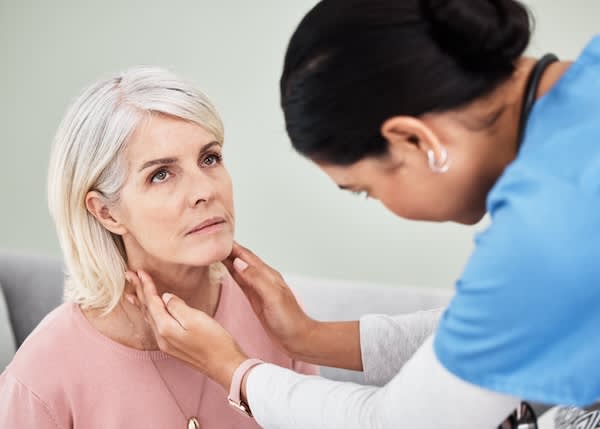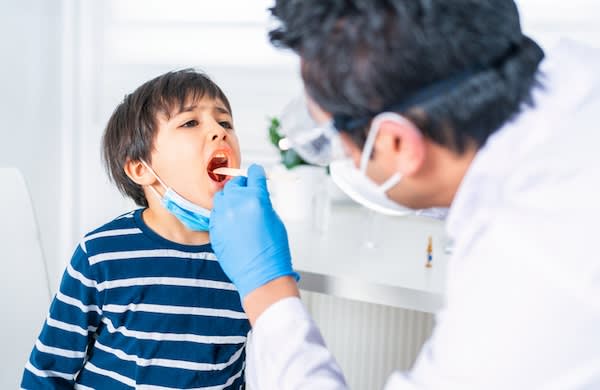Lymphoma signs and symptoms explained
[8 MIN READ]
In this article:
-
Lymphoma is a rare blood cancer that starts in the white blood cells (lymphocytes). There are two main types: Hodgkin lymphoma and non-Hodgkin lymphoma, and more than 70 subtypes.
-
Symptoms of lymphoma can include painless swelling in the lymph nodes in the neck, armpit or groin, along with drenching night sweats, fever, fatigue, itching and unexplained weight loss. See your doctor if these don’t go away within a few weeks.
-
Lymphoma often can be successfully treated or cured. Treatments include chemotherapy, radiation, targeted therapy, immunotherapy, CAR T-cell therapy and stem cell transplant.
What is lymphoma? Understanding the signs, symptoms and treatment
Lymphoma is a blood cancer that starts in the white blood cells (lymphocytes). These are produced in the bone marrow and flow through the lymph system.
The lymph system is a network of tissues, vessels and organs throughout your body. It’s part of your immune system, which protects you from infection and disease.
Lymphoma is rare and often can be successfully treated or cured. Learn more about lymphoma, its causes, symptoms and treatment options.
Introduction to lymphoma
There are two main types of lymphoma: Hodgkin and non-Hodgkin. Some people also refer to these as Hodgkin’s lymphoma and non-Hodgkin’s lymphoma (NHL cancer). More than 70 subtypes of lymphoma exist.
- Hodgkin lymphoma: Hodgkin lymphoma accounts for 0.4% of all cancer cases. It is characterized by mutant cells called Reed-Sternberg cells. There are two main types: classic and nodular lymphocyte predominant.
- Non-Hodgkin lymphoma: About 90% of lymphoma diagnoses and 4% of all cancer cases are NHL. There are two categories: B-cell lymphomas and T-cell lymphomas. These types of lymphomas can be high-grade (which are fast-growing) or low-grade (which are slow-growing).
Causes of lymphoma
The causes of lymphoma are unknown. Changes in the genes lead to mutations in the white blood cells. These abnormal cells then multiply uncontrollably and live longer than normal cells.
“There are no known causes of lymphoma and no screening test for it,” says Natasha Edwin, M.D., a hematologist and medical oncologist at Providence Cancer Center Oncology and Hematology Care Clinic, Westside Portland. “We know it’s not a ‘lifestyle cancer’ that’s associated with choices like diet, lack of exercise, use of tobacco and other factors.”
Some factors can increase your chances of getting Hodgkin and non-Hodgkin lymphoma. These include:
- Age: Hodgkin risks are higher in early adulthood (ages 20-39) and late adulthood (65 and older). Non-Hodgkin risks are higher in people 60 and older.
- Exposure to radiation or toxins: Benzene or chemicals that kill bugs or weeds can increase risks.
- Family history: Having a parent, brother or sister who has lymphoma can increase your risk.
- History of viruses and infections: Epstein-Barr, HIV and other viruses can increase risks., as can H. pylori, hepatitis C and other infections.
- Sex: Lymphoma is more common in men than women
- Weakened immunity: People with an autoimmune disease, organ transplant or inherited immune disorder can be at higher risk.
Common signs and symptoms of lymphoma
Swollen lymph nodes are the most frequent sign of lymphoma. They often appear in the neck, armpit, groin or belly. While they’re usually painless, they grow larger as the cancer cells build up in them.
Other common symptoms include:
- Drenching night sweats
- Fatigue that doesn’t go away and interferes with activities of daily living
- Fever for no known reason
- Itching with or without a rash
- Pain in the chest, belly or bones
- Persistent cough
- Shortness of breath
- Stomach swelling
- Unexplained weight loss of 10% of body weight within six months
Many signs of lymphoma are like those of other diseases. Talk to your doctor if you have any symptoms that don’t go away within a few weeks or if you’re concerned you might have lymphoma.
Diagnosing lymphoma
Your doctor will review your health history and do a physical exam. A biopsy is necessary to diagnose lymphoma, Dr. Edwin says. Your doctor removes part of a lymph node or the entire lymph node to look at in a lab for cancer cells.
Other tests for lymphoma may include:
- Blood tests, which help your doctor find out more about the type of lymphoma you have and how it’s affecting your body
- CT and PET scans, which provide detailed pictures that show where the lymphoma is and if it has spread
- Genetic testing, which helps your doctor assess the biology of the lymphoma and the prognosis
“We use CT and PET scans to stage the disease,” Dr. Edwin says. “Staging is the process of working out which parts of your body are affected by lymphoma and how advanced your lymphoma is.”
Treating lymphoma
Treatments for lymphoma vary based on what type you have and its stage, along with your symptoms, overall health and preferences.
If you have a slow-growing lymphoma with few or no symptoms, your doctor may recommend active surveillance (also known as watch and wait). You and your doctor will continue monitoring your condition over time and begin treatment if necessary.
Treatment options for lymphoma include:
- Chemotherapy: Drugs are used to kill lymphoma cells or stop them from dividing. These come in forms like pills and intravenous (IV) options and travel throughout your body.
- Radiation: High-energy rays are applied directly to the part of the body with lymphoma to destroy cancer cells.
- CAR T-cell therapy: In this newer therapy, doctors take some of your white blood cells and send them to a lab. They’re treated to recognize and destroy lymphoma cells. Then, they’re put back in your body.
- Immunotherapy: A type of targeted therapy, this uses your body’s immune system to find and destroy cancer cells. It is typically given as an IV infusion or injection under the skin every few weeks.
- Stem cell transplant: Chemotherapy is used to destroy your existing stem cells. Then, healthy stem cells previously taken from your body or from a donor are transplanted into your body.
- Targeted therapy: Medications attack lymphoma cells to stop them from growing. They can be used alone or combined with other treatments.
Surgery is an unlikely treatment for lymphoma, because it’s difficult to remove all cancer cells. Your healthcare team will work with you to design a personalized treatment plan.
“After treatment, it takes time to recover,” Dr. Edwin points out. “While finishing lymphoma treatment is a relief, you may still have side effects for some time.”
Your prognosis depends on the type of lymphoma you have, how far it has spread, the treatment you get, your age and your overall health. Often, lymphoma can be cured or put into remission. This means you don’t have symptoms and tests don’t find signs of lymphoma.
But sometimes it can come back. Watch for signs of a relapse and tell your doctor about any symptoms immediately. If that happens, you may need treatment again.
Innovations in lymphoma research
Research is ongoing for new and improved treatment options for lymphoma.
Researchers are examining how to shorten the duration of chemotherapy and reduce the amount of radiation to decrease long-term toxicity in patients with Hodgkin lymphoma. They’re also examining therapies for non-Hodgkin lymphoma, such as how to:
- Improve CAR T-cells to minimize side effects
- Manufacture CAR T-cells faster
- Treat lymphoma with vaccines
- Use new targeted therapies and bispecific antibodies (immunotherapy)
You can be part of a clinical trial that is testing some of these new therapies before, during or after starting your treatment for lymphoma. Providence has ongoing clinical trials to evaluate new approaches to treating non-Hodgkin and follicular lymphomas. Talk to your doctor if you’re interested in participating.
For a deeper dive into this condition, take a look at Dr. Edwin’s recent presentation on lymphoma.
Contributing caregiver
Natasha Edwin, M.D., is a hematologist and medical oncologist at Providence Cancer Center Oncology and Hematology Care Clinic, Westside Portland in Portland, Oregon.
Find a doctor
If you are looking for a primary care provider, you can search for one who’s right for you in our provider directory.
Download the Providence app
It’s all in the app: easily stay connected with Providence and your health. With the Providence app, you can schedule appointments, have virtual visits from the comfort of your own home, get health recommendations personalized for you, access your health records and so much more. Learn more and download the app.
Related resources
Understanding lymphoma: The basics and beyond with Dr. Natasha Edwin
Two trials evaluate new approaches to treating non-Hodgkin and follicular lymphomas
This information is not intended as a substitute for professional medical care. Always follow your health care professional’s instructions.




